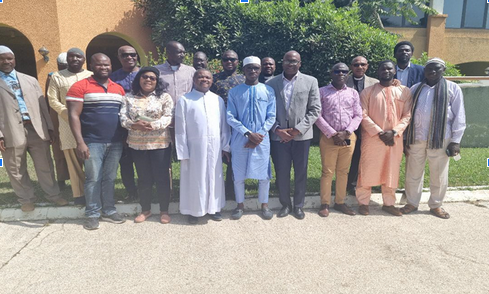The two-day training workshop for faith leaders and groups of civil society organisations took place on 23rd -24th February, 2023 at the Kairada Beach Hotel, Senegambia in Greater Banjul, The Gambia. In all, twenty-three (23) participants took part in the training workshop, of this number, there were only two (2) female participants and remaining twenty-one (21) were male. The workshop set out to equip participants with requisite skills to help them engage parliament more effectively and also to understand and appreciate the significance of freedom of religion or belief (FoRB) in the context of human rights in The Gambia. Of particular importance is the role faith leaders and CSOs can play in promoting and protecting FoRB in The Gambia. This obviously requires the building of synergy between parliament and civil society actors so that their work can complement one another in addressing issues of discrimination against minority groups and marginalisation people living on the edge of society in The Gambia.
Mr. Issifu Lampo, standing in for the Executive Director of the African Centre of Parliamentary Affairs (ACEPA), Dr. Rasheed Draman thanked the participants for their commitment and hoped that they would find the workshop useful to their work and encouraged them to participate fully and maximise the opportunity to learn and share their perspectives; and also to bond and broaden their networks.
Jimmy Cole, Deputy Head, Interfaith, Inter-Church of The Gambia, speaking on behalf of the faith leaders and CSOs present thanked the British Government, particularly the Foreign, Commonwealth and Development Office for the immeasurable financial support and the African Centre for Parliamentary Affairs (ACEPA) and the Freedom of Religion of Belief Leadership Network (FoRBLN) for providing leadership and direction in the implementation of the project. Rev. Cole underscored the significance of the training workshop as it seeks to impart knowledge that could help them in their advocacy engagements, especially sensitization efforts in explaining what freedom of religion or belief entails in the context of The Gambia. Three sessions were held with the first session’s seeking to enhance participants’ understanding of how parliaments functions and the power sources within and outside the institution of parliament; the presentation examined the structure of the institution of parliament, key actors and their roles, parliamentary procedures and the interplay of power dynamics both inside and outside parliament.
The second session was to ensure that participants had a shared understanding of what freedom of religion or belief (FoRB) stands for, limitations of FoRB as a fundamental human right every human being is entitled to, and highlight circumstances where these rights could be circumscribed. In addition, the session sought to address some misconception associated the how FoRB is perceived. especially on the African continent.
The third session focused on global trend and challenges in promoting and protecting FoRB with the view to understanding how governments, state and non-state actors treat their citizens relative to FoRB rights. According to 2010 International Development Law Organization report, November, 2016, 84% of the global population (as of 2010) identified with a religious group. On the other hand, religious restrictions and hostilities have risen steadily over the past decades. Government restrictions have risen in several different ways. Laws and policies restricting religious freedom (such as requiring that religious groups register in order to operate) and government favouritism of religious groups (through funding for religious education, property and clergy, for example) have consistently been the most prevalent types of restrictions globally.

